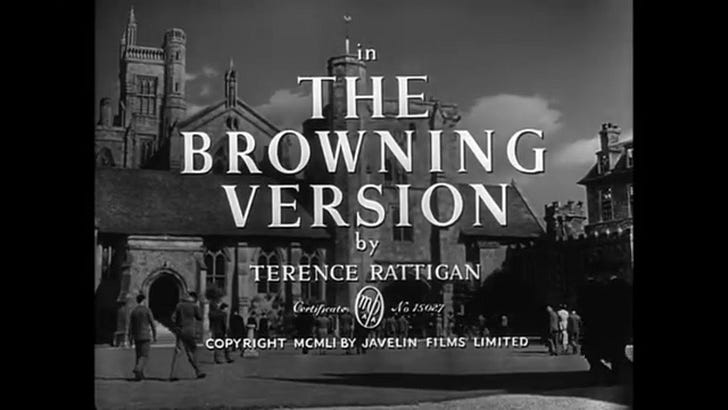This week, as I’ve been considering melancholy, I’ve defended it as that sweet feeling of twilight, with the moon shining on the waters, and perhaps a loneliness that is not unpleasant, because you know that it is a temporary thing. Your loved ones are in the house on the hill, and the lights are shining.
But there is another melancholy that in fact is steeped in loneliness, a tragic solitude. I can’t find the feeling described in all of the many-sided and gloriously colored literature of the high Middle Ages. Hard to be lonely in that time, when everything that people did, they did in groups, in families, schools, monasteries, guilds, armies, pilgrimages, manors, and towns, and nobody but a perfect madman would go walking out on the moors just for the feeling. With the modern age it enters, and in our time, when the family itself is fraying, it stalks the soul of the unfortunate, or of the failed. And that’s the case with the chief personage in our Film of the Week, The Browning Version (1951). Please note well: there was a remake in the 90’s. You don’t want the remake. You want the original.
One of the things I’ve noticed about black and white movies is that the very limitation requires the actors and the director to do some important things to seize the audience’s attention. Namely, they must focus on the most expressive things we know of, the most beautiful, the homeliest, the gentlest, the cruelest, the most innocent, the most deeply plunged into guilt: the human face, and the human hands. No cheap effects are possible.
When you combine that requirement with a script that makes every word count, and you have actors who know what they are about, especially in the 1950’s, when excellent playwrights also wrote for the big screen and brought with them their spare and intensely concentrated sense of human drama, you can get real greatness, in stories that can never be dated, because they are not about this or that political condition or this or that new social movement, but about man himself, his glory and his shame. That’s what we have in The Browning Version (1951). Terence Rattigan wrote the story as a play for the stage, and then he punched up his script for the cinema, with the excellent Anthony Asquith directing. Here’s the story. A teacher at a boys’ school in England, one Andrew Crocker-Harris (Michael Redgrave), is nearing the end of his career. He is in poor health. He has married badly, and his wife (Jean Kent), who has long been bored and irritated with him, is having an affair with another of the teachers (Nigel Patrick), a generally decent fellow but engaged in a very bad thing. The headmaster (Wilfrid Hyde-White) is an unctuous and malevolent man who wants Crocker-Harris out of the way. The boys that Mr. Crocker-Harris tries to teach Greek to are dispirited and uninterested in what he does. But there is one boy, Taplow, who does not simply despise him. Under Crocker-Harris’ direction, he has been taking extra lessons in Aeschylus’ Agamemnon, to help boost his grade in the class. In the Agamemnon, we should know, that Greek general returning triumphant from the Trojan War is murdered by his wife Clytemnestra, as an act of vengeance, because Agamemnon had been maneuvered into sacrificing their daughter Iphigenia, to get fair winds for Troy. And Clytemnestra has a lover too, Aegisthus, who has his own family reasons for wanting Agamemnon dead.
The plot of the Agamemnon, you might think, could strike Mr. Crocker-Harris a bit too close to home, but he’s long taught Greek literature in a hopeless way, having given up on expecting any of the boys to love what he once loved, and what he still loves, somewhere, deep in his soul. Then something slight, some little spark of a real human interchange, comes to life between the lonely, off-putting, hopeless old fellow, and the boy Taplow, who does seem to understand a little bit about both the play they are reading and his mostly ineffectual teacher. The film is called The Browning Version for the gift that Taplow finds in a used book shop, a copy of a translation of the Agamemnon, made by the poet Robert Browning. For Crocker-Harris himself had tried his hand at translating it, long ago – but like everything else in his life, it has come to nothing.
It’s a movie about the bare possibility that a dead soul may come to life again. The drama is riveting and relentless. I will not give out any spoilers. Hear the words, and watch the faces.




Looking forward to watching this. I have never even heard of it! And I love your points about black and white movies—I have often thought that it takes some level of experience watching black and white movies in order to really appreciate the film as a work of art. Many of my own peers (and I am 60 these days) have little to no experience watching old black and white movies and their taste suffers for it.
The tragic solitude of the residents of Oran after being locked in to their town in The Plague written by Albert Camus (1947) is that sort of melancholy, portrayed well by the author and felt by the reader. My daughter said the author was a philosopher and she has a minor in philosophy. If you haven't read it, try it, it's a Tony Esolen kind of literature. ;)